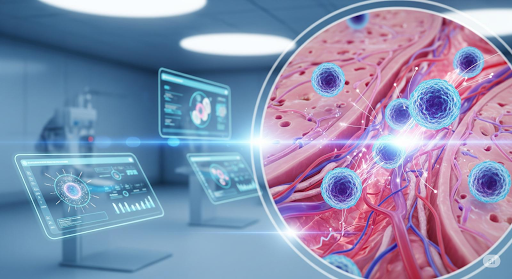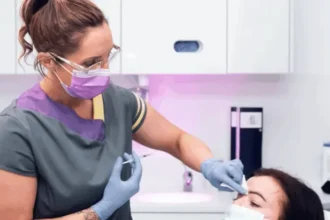Introduction
Ever heard of stem cell therapy for things like sore knees or autoimmune issues? It’s all over the news, and one type in particular, called Mesenchymal Stem Cell (MSC) therapy, is getting a lot of attention. With hundreds of studies happening worldwide, you might be wondering if it’s an option for you. This guide will walk you through what MSCs are, how they work, what conditions they might help, and the most important questions you should ask before considering treatment.
What Are MSCs, Anyway?
Think of MSCs as your body’s personal repair crew. They’re a type of cell found in various places, like your bone marrow, fat, and even in umbilical cord tissue. Instead of directly replacing damaged cells, they work like a team leader. They release powerful signals that:
- Calm things down: They tell your immune system to stop overreacting and causing inflammation.
- Encourage healing: They send out growth factors that help new blood vessels form and tissues to repair themselves.
- Prevent scarring: They can help reduce the buildup of scar tissue.
These cells are grown in a lab from a small sample to create millions of “off-the-shelf” cells for treatment.
Conditions Showing the Most Promise (2025)
While still mostly in clinical trials, MSCs are showing exciting results for several conditions.
- Knee Osteoarthritis: People with knee pain from arthritis have reported significant relief, and some studies suggest it may help slow down cartilage damage.
- Graft-Versus-Host Disease (GvHD): This is a serious complication after a transplant. MSCs have shown a high success rate in calming this overactive immune response.
- Perianal Crohn’s Disease: MSCs have been successfully used to help close painful fistulas (tunnels) in patients with Crohn’s disease. In the EU, one specific MSC product is already approved for this purpose!
- Long COVID: Early studies are exploring how MSCs might help with severe fatigue and lung problems, with larger trials now in progress.
Who Can Get MSC Therapy?
It’s not for everyone. You might be a good candidate if you:
- Have a confirmed diagnosis for one of the conditions being studied.
- Haven’t found relief with standard treatments.
- Are in generally good health otherwise.
You should wait or avoid it if you:
- Have active cancer.
- Are pregnant or breastfeeding.
- Are currently experiencing a major autoimmune flare-up.
Your Treatment Journey
- First Meeting: A doctor will review your health history and confirm if you’re a good fit for a clinical trial or treatment.
- Getting the Cells: The MSCs can come from your own body (autologous) or a donor (allogeneic), which is an “off-the-shelf” option.
- The Treatment: You’ll receive the cells either through an IV drip or a specific injection into the area that needs healing, like a joint.
- Follow-Up: You’ll have check-ups to see how you’re feeling and track your progress.
Is It Safe?
For the most part, yes. When handled by experienced doctors in certified labs, MSC therapy is considered safe. Side effects are usually minor, like a temporary fever or soreness, and go away quickly. Long-term studies have not found any increased risk of cancer.
What About the Cost?
The cost can vary a lot. If you join a clinical trial, the treatment is often free. For other options, the price can range from about $8,000 to $30,000, and insurance usually doesn’t cover it. Always ask for a full cost breakdown before you commit to anything.
Essential Questions to Ask
This is the most important part! Always ask these questions to any provider:
- Is the lab that processes the cells certified and inspected?
- How many patients like me have you treated, and what were their results?
- What scientific evidence supports this specific treatment?
- What exactly is included in the price?
- How will you monitor and manage any side effects?
Conclusion
Mesenchymal stem-cell therapy offers realistic hope for several hard-to-treat conditions, particularly when conventional options fall short. It’s not a standalone cure, but a powerful tool that, when combined with healthy lifestyle choices, could make a big difference. The key is to be informed, ask tough questions, and partner with a trustworthy medical team. As the 2025 data pipeline grows, staying up to date is crucial. For additional facts and resources on MSCs, consider checking out the EuroGCT website, a great resource for understanding cell and gene therapy.
Disclaimer: This article is for informational purposes only and is not a substitute for professional medical advice.

















